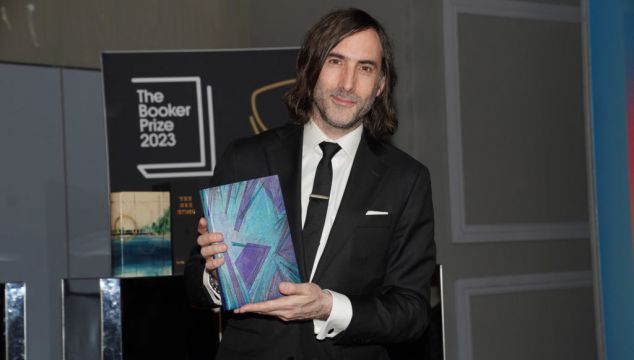Irish author Paul Lynch said his Booker prize-winning novel about Ireland’s descent into dictatorship was based on events which were “already occurring”.
The writer, whose novel Prophet Song won him the prestigious prize on Sunday, said he felt like he had lived through events he had already written about when the world went into lockdown during the pandemic.
Speaking on BBC Radio 4’s Today programme, Lynch said: “The book is also simulating events that have already been occurring, that are occurring, that have occurred in the past, that will occur in the future.

“It is tapping and seeking out universals.
“It got very strange because there are sequences in the book where the state control begins to grip and there are curfews.
“I had already written these sequences and so I found myself living through them (in the pandemic).”
Prophet Song, Lynch’s fifth novel, is a tale of a tyrannical government and a mother-of-four working as a scientist whose husband is taken away by the newly formed Irish secret police.
‘This was not an easy book to write.’
Watch @paullynchwriter's #BookerPrize2023 acceptance speech.https://t.co/o890YuwYOV pic.twitter.com/AgQ65hPGhg— The Booker Prizes (@TheBookerPrizes) November 26, 2023
The 2023 Booker Prize was awarded after violence involving far-right groups erupted in Dublin last week, with Garda cars, buses and trams set alight, and shops looted and damaged.
Canadian novelist Esi Edugyan, chairwoman of the 2023 judges and a previous Booker-shortlisted author, said at the awards ceremony in London that Prophet Song captured the “social and political anxieties of our current moment”, adding that readers would not “forget its warnings”.
But speaking on Monday, Lynch insisted he was not a “political novelist”.
The 46-year-old, who lives in the Irish capital, said: “No, it’s not (a political book) and I find myself being shaped into a political novelist now.

“It’s something I was deeply aware of when I was writing the book – there are serious pitfalls if you are setting out as a writer to air a grievance.
“I think the work of the serious novelist is about grief and so this book arrives at a place where it has moral weight.
“The things that I’m interested in are the problems that the characters face – which are to do with life and death … the known world disappearing.
“Many of us would say that we are living in some kind of unravelling – the question is where does this lead to down the road? It’s one of the things I’m exploring.”

Lynch also said he would use the £50,000 (€57,000) prize money to pay off his mortgage, which he said was “sliding away out of my grasp”.
This year, he beat fellow Irish writer Paul Murray, who was shortlisted for The Bee Sting, which follows an Irish family facing financial and emotional troubles.
All of the shortlisted authors – including British author Chetna Maroo, American novelist Jonathan Escoffery, Canadian author Sarah Bernstein and US author Paul Harding – received £2,500 and a bespoke bound edition of their book.
Margaret Atwood, Dame Hilary Mantel and Sir Salman Rushdie are among previous Booker winners.







